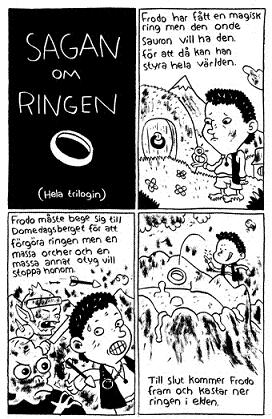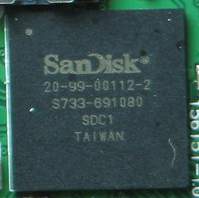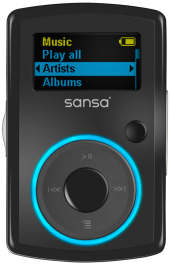I took the X2000 train to Gothenburg from Stockholm at 08:10 so I was at the conference place first at almost 11:30.
SELF
This meant I got to listen in on the end of Jonas Öberg‘s speech on SELF (an FSF Europe and others project on e-learning and a lot of related matters). This wasn’t really my cup of tea, but the other track had a MySQL talk and that isn’t really my thing so I had to just pick one… 🙂 Nothing bad about the subject or Jonas really, just a hint of where my interests are not so much.
Lunch
At lunch I got the opportunity to catch up with Squid-Henrik (Nordström) to talk about recent happenings in our projects. Squid being about to release v3 after several years, and I could report that curl has gotten support for SSH-related protocols during the last year or so… I also exchanged a few words with Peter Stuge who expressed interest in hacking on libssh2 recently, and well I have done some of that!
Qtopia
 Knut Yrvin from Trolltech Norway did an excellent talk on Qtopia in the Telecom business, which had changed name from something involving Greenphone since they have since ditched that project. Anyway, he spoke of the upcoming possible opportunities for free software and open source in consumer electronics, and then particularly in smart phones and then of course mostly related to Qt and Qtopia. He passed around a Greenphone to let us get a feel or it and fiddle a bit with it and yes, it seemed like a nice phone – not a lot bigger or heavier than my current Sony Ericsson thing. It featured a nice “sliding UI” even if I had serious troubles moving around in the system and I couldn’t really figure out the maneuvering concept much! I suspect all it would take is a little more time and perhaps a manual or someone explaining it to me.
Knut Yrvin from Trolltech Norway did an excellent talk on Qtopia in the Telecom business, which had changed name from something involving Greenphone since they have since ditched that project. Anyway, he spoke of the upcoming possible opportunities for free software and open source in consumer electronics, and then particularly in smart phones and then of course mostly related to Qt and Qtopia. He passed around a Greenphone to let us get a feel or it and fiddle a bit with it and yes, it seemed like a nice phone – not a lot bigger or heavier than my current Sony Ericsson thing. It featured a nice “sliding UI” even if I had serious troubles moving around in the system and I couldn’t really figure out the maneuvering concept much! I suspect all it would take is a little more time and perhaps a manual or someone explaining it to me.
OpenMoko
 In the subsequent talk Ole Tange from the OpenMoko project also handed out “fiddle-versions” of their primary phone, Neo1973 for us in the audience to touch and hold. The major bad with these were however that both devices were dead so we couldn’t see anything on them, just hold them and feel that… eh yeah. they’re a bit on the biggish side and quite a bit bigger than my current phone in all three dimensions! He spoke about the upcoming 2nd version of the phone that is supposed to become available in Q1 2008 and given that it will feature wifi, bluetooth, accelerometers, GPS, 640×480 pixels touch screen, accelerated graphics card and a mini-B USB plug and run an entirely open and free Linux version with documented hardware is indeed thrilling. The Neo1973’s size is not attractive, but its internals are. This is in fact a unit I will seriously consider buying/hacking when/if it becomes available for purchase.
In the subsequent talk Ole Tange from the OpenMoko project also handed out “fiddle-versions” of their primary phone, Neo1973 for us in the audience to touch and hold. The major bad with these were however that both devices were dead so we couldn’t see anything on them, just hold them and feel that… eh yeah. they’re a bit on the biggish side and quite a bit bigger than my current phone in all three dimensions! He spoke about the upcoming 2nd version of the phone that is supposed to become available in Q1 2008 and given that it will feature wifi, bluetooth, accelerometers, GPS, 640×480 pixels touch screen, accelerated graphics card and a mini-B USB plug and run an entirely open and free Linux version with documented hardware is indeed thrilling. The Neo1973’s size is not attractive, but its internals are. This is in fact a unit I will seriously consider buying/hacking when/if it becomes available for purchase.
Other details in his OpenMoko talk gave me the impression that the software is not yet very far advanced. Like he first made a comparison to the OLPC system with hw and sw items side-by-side both listing as GTK+ based UIs, but then he also mentioned a thanks to Trolltech for having ported their Greenphone Qtopia system to OpenMoko. On my direct question if that wasn’t a bit contradictive since surely they must be focusing on ONE of these graphics/widgets systems for their main development, he went on to rant about how OpenMoko “is a computer” that can “run anything”. I’m not sure, but it certainly gave me the impression that there just is no main development… Where is OpenMoko at right now really? Anyone knows? I guess I should spend some time on researching that, and also investigate a bit on the “running Rockbox on OpenMoko” front…
curl
 When the time came for my talk, at 15:00 we first had to mess about a bit since the computer I was supposed to borrow to run my presentation on was suddenly gone (and used for the other track’s talk I later learned) but thanks to other people I soon had a replacement and I got on with it.
When the time came for my talk, at 15:00 we first had to mess about a bit since the computer I was supposed to borrow to run my presentation on was suddenly gone (and used for the other track’s talk I later learned) but thanks to other people I soon had a replacement and I got on with it.
I know the topic by heart of course, curl being my primary open source project for ten years and I know every bit of it and its history and so on, but making a fine presentation based on that is an entirely different story. Also, giving it in English adds a layer of, well not complexity perhaps, but it makes it all bit more rough in the edges since even though I know English pretty well and all, my vocabulary isn’t the largest and I don’t always find the right synonyms and the phrasing etc when trying to explain or argue for my sake.
Also, since I don’t quite know my own presentation by heart it isn’t really the best possible performance I can do, but what the heck. I tried to present curl and libcurl, what they are and what they’re good for, why people use it and how the development is done and why YOU should use it now and in the future. The guys at fscons got all talks on video so I hope to be able to see myself on video soon and I’ll try to learn from that for my next talk. And of course those of you who weren’t present at fscons will get your chance to see my pale face and listen to my Swedish-accented stumbling English! 😉 Oh, and I had to rush the presentation a bit towards the end when my 45 minutes ran out a little bit faster than I had anticipated, or was it the questions that popped up? Questions are good, since they make me aware the audience is with me and are interested.
I’m not sure if the topic of curl is somewhat boring, or if it felt too technical or what, but I think I had less than 50% of the audience listening. The other talk going on while I spoke was a lightning talk session with a bunch of people.
Here’s the slides from my talk, in a 31 page 500K pdf: http://daniel.haxx.se/curl-20071208.pdf
LinuxBIOS
Slightly dry in my mouth after this, I recharged myself with a cup of coffee and some cinnamon-rolls and walked it to see the next talk. Or rather series of talks since this was a “lightning talks” session where five guys spoke quickly about various topics. They were about web development with perl, a weird ajax system called gaia that seemed to involve a lot of .NET, a web development system of some sorts named makumba, and a quick mentioning of a 10 gigabit full open source router. For me, the most interesting piece was Peter Stuge’s brief talk about LinuxBIOS, what it is, what it does and so on. That’s really a to-the-metal project and I like getting back to earth and on to real stuff. Much of what he said and explained about difficulties with documentation from hardware vendors etc are just so familiar to me based on Rockbox experiences. To the great enjoyment of the audience, Peter’s live demo of LinuxBIOS booting up failed notoriously and after numerous resets it finally booted up and started playing loud music – when the following speaker already was half-through his router presentation!
Closing
I only got to hear the beginnings of the closing talk held by Georg Greve from FSF Europe as I had to leave after 20 minutes or so to catch my cab that took me back to the train station and I was on my way back to Stockholm again on the 18:42 train…
Did I mention that I got a tshirt? I planned to include a picture of the shirt here, but I took a shot with my mobile phone when I got home and the camera in it is just so extremely crappy in low-light situations (even if I had all the lights in the room turned on) so I can’t torture you by including it. I’ll have to make another attempt later or find a link to someone else who did…
In conclusion: even though I only did a quick visit and didn’t get to see that many talks, I liked what I saw and I had fun. It sounded like the guys doing this are seriously planning on doing it again next year. I hope they’ll do and that I’ll manage to do there again, hopefully to do another talk!


 It’s a great and fun read and one of those books you can have lying around and just read a random page every now and then and enjoy them every time.
It’s a great and fun read and one of those books you can have lying around and just read a random page every now and then and enjoy them every time.
 I wrote up a small tool that would try out some variations of an “addition algorithm” with 32 bit adds and with 8 bit adds and then I tried with XORs instead to the same effect. Then it struck me that the value in the header at index 0x0c was not changing by a lot between firmwares and it had a number which was an index after the change I mentioned above, but before the subsequent changes…
I wrote up a small tool that would try out some variations of an “addition algorithm” with 32 bit adds and with 8 bit adds and then I tried with XORs instead to the same effect. Then it struck me that the value in the header at index 0x0c was not changing by a lot between firmwares and it had a number which was an index after the change I mentioned above, but before the subsequent changes…
 Many of the hackers involved in the
Many of the hackers involved in the  Motorola has a series of phones usually referred to as the EZX phone platform (the
Motorola has a series of phones usually referred to as the EZX phone platform (the  While the N800 series isn’t exactly a phone (although you can do IP-telephony over wifi with it), it is an “internet tablet” from
While the N800 series isn’t exactly a phone (although you can do IP-telephony over wifi with it), it is an “internet tablet” from 
